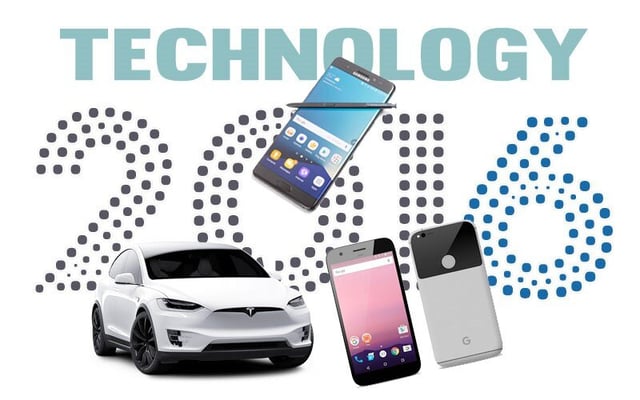What made headlines in techworld in 2016

While the year witnessed next-generation innovations like Artificial Intelligence (AI), Virtual Reality (VR) and augmented reality (AR) being introduced into daily lives and into smartphones at a mass level, some flagship failures dented the image of some tech companies.
The biggest setbacks to the tech industry came in the form of the Samsung Galaxy Note 7 fiasco and driverless cars that met with fatal accidents.
Galaxy Note 7 -- launched in August amid much fanfare -- was poised to be in direct competition with the Apple flagship iPhone 7 and Google flagship Pixel. However, batteries started exploding and devices caught fire while charging, forcing the South Korean giant to recall 2.5 million units worldwide in September.
The company encouraged Note 7 owners to swap their devices with new ones, but the replacement Note 7 devices too caught fire, leading to production being halted in October.
The device finally landed up in the junkyard, with Samsung calculating the impact of the sales halt (after the mishap) at $2 billion in the fourth quarter of 2016 and $880 million for the quarter from January to March 2017.
The next big tech wave came with driverless or autonomous cars -- an industry where bigwigs like Google, Tesla, Volvo, Uber, LeEco and now Apple are trying to make the nascent technology a big reality. The global autonomous cars market is expected to reach 138,089 units by 2024, according to a new study by US-based Grand View Research.
However, in May, the self-driving car community was left in shock when Joshua Brown, 40, of Ohio was killed when his Tesla Model S electric sedan crashed into a tractor-trailer while on auto-pilot mode.
Tesla said the car failed to notice the tractor trailer "against a brightly lit sky" and the brakes failed to kick in.
In what was dubbed as the worst accident involving an autonomous vehicle, in September, a Google driverless car collided with a commercial van that ran a red light in California.
According to a recent study by the University of Michigan, about 40 per cent of Indians and 36 per cent of Americans said they would be apprehensive when riding in self-driving cars.
Amid the gloom came one piece of good news. An 18-wheeler self-driving Volvo trailer travelled from Fort Collins, Colorado, to Colorado Springs, bearing 50,000 cans of Budweiser beer as part of a trial-run.
The vehicle, equipped with cameras and sensors, was owned by Otto, a self-driving truck company Uber recently acquired.
This brought hope that all is not lost yet and driverless cars have the potential to hit the roads sooner than later.
Highlights of the year:
* Following the Galaxy Note 7 fiasco, Samsung recalled 2.5 million units in September and finally halted its production in October.
* The global autonomous cars market is expected to reach 138,089 units by 2024.
While the year witnessed next-generation innovations like Artificial Intelligence (AI), Virtual Reality (VR) and augmented reality (AR) being introduced into daily lives and into smartphones at a mass level, some flagship failures dented the image of some tech companies. The biggest setbacks to...
While the year witnessed next-generation innovations like Artificial Intelligence (AI), Virtual Reality (VR) and augmented reality (AR) being introduced into daily lives and into smartphones at a mass level, some flagship failures dented the image of some tech companies.
The biggest setbacks to the tech industry came in the form of the Samsung Galaxy Note 7 fiasco and driverless cars that met with fatal accidents.
Galaxy Note 7 -- launched in August amid much fanfare -- was poised to be in direct competition with the Apple flagship iPhone 7 and Google flagship Pixel. However, batteries started exploding and devices caught fire while charging, forcing the South Korean giant to recall 2.5 million units worldwide in September.
The company encouraged Note 7 owners to swap their devices with new ones, but the replacement Note 7 devices too caught fire, leading to production being halted in October.
The device finally landed up in the junkyard, with Samsung calculating the impact of the sales halt (after the mishap) at $2 billion in the fourth quarter of 2016 and $880 million for the quarter from January to March 2017.
The next big tech wave came with driverless or autonomous cars -- an industry where bigwigs like Google, Tesla, Volvo, Uber, LeEco and now Apple are trying to make the nascent technology a big reality. The global autonomous cars market is expected to reach 138,089 units by 2024, according to a new study by US-based Grand View Research.
However, in May, the self-driving car community was left in shock when Joshua Brown, 40, of Ohio was killed when his Tesla Model S electric sedan crashed into a tractor-trailer while on auto-pilot mode.
Tesla said the car failed to notice the tractor trailer "against a brightly lit sky" and the brakes failed to kick in.
In what was dubbed as the worst accident involving an autonomous vehicle, in September, a Google driverless car collided with a commercial van that ran a red light in California.
According to a recent study by the University of Michigan, about 40 per cent of Indians and 36 per cent of Americans said they would be apprehensive when riding in self-driving cars.
Amid the gloom came one piece of good news. An 18-wheeler self-driving Volvo trailer travelled from Fort Collins, Colorado, to Colorado Springs, bearing 50,000 cans of Budweiser beer as part of a trial-run.
The vehicle, equipped with cameras and sensors, was owned by Otto, a self-driving truck company Uber recently acquired.
This brought hope that all is not lost yet and driverless cars have the potential to hit the roads sooner than later.
Highlights of the year:
* Following the Galaxy Note 7 fiasco, Samsung recalled 2.5 million units in September and finally halted its production in October.
* The global autonomous cars market is expected to reach 138,089 units by 2024.









Leave a Comment